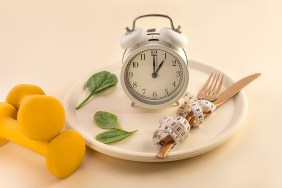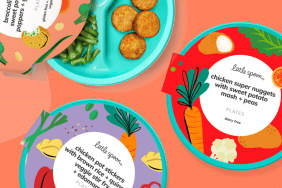When billions of dollars are at stake, there’s bound to be a great amount of misinformation about nutrition and dieting. Don’t fall prey to commonly believed fallacies about food and health! Here’s a look at diet myths that may be getting in the way of your healthy lifestyle goals.
Don’t Eat After 6:00 p.m.
The best thing you can do is learn to listen to your body and eat when you are actually hungry. There is no research to prove that eating the same meal at 6:00 p.m. versus 8:00 p.m. will be any more beneficial to you or make you gain less weight. Body cues aside, it’s more important to take into consideration things like when you will be going to sleep and what you will be doing first thing in the morning (i.e., do you have an intense workout scheduled and no time to fuel up with breakfast?).
There Is a Set Amount of Water You Need to Be Drinking
There’s no question that getting enough water is imperative (it’s crucial for everything from regulating body temperature to getting rid of waste). Unfortunately, there is no set liter or glass amount that can be suggested across the board. Not only do many people get a large percentage of the water they need to support their body through food (namely fruits and vegetables) and non-water beverages (fruit juice, even soda can help provide the body with some of the fluids it needs), but how much water you need will also depend on the climate in which you find yourself and how much you are moving. It may seem like a no-brainer, but if you exercise a lot, you’ll need to hydrate more. Also, some medications may affect your hydration levels.
All Fats Are Bad
While you’ll want to keep your cholesterol level in mind as well as saturated versus unsaturated versus trans fats, a healthy body needs fat for energy. Nuts, seeds, olive oil and fish are all commonly found healthy fat sources. And some nutritional experts are moving away from the fat is bad model by encouraging the consumption of fat for a trimmer waistline and healthier heart.
There Is Such a Thing as Eating for Your Blood Type
A number of books have been written on this topic, but there is no evidence to support that there is any validity to a diet based on the ABO blood group system.
Juicing Will Help You Lose Weight
This myth is especially important for people who are adding juices — often very high in sugar and devoid of fiber — to without eliminating anything devoid of nutritional value from their diet. For juices to be healthy, they must have fiber, low sugar, and a lot of veggies. For more on the right way to juice, read our guide here.
Gluten Is Bad for Everyone
The gluten-free industry has exploded these past few years and many popular diets, like Paleo, advocate eliminating all grains. Only about one percent of the population actually has celiac disease, and it’s important to remember that eliminating any food group in its entirety, unless there is a true medical reason, could be setting you up to miss out on key nutrients.
The Best Diets Are Salt Free
Almost all processed food products, even sweet ones, contain sodium, and many in very high amounts. It’s important to watch your salt intake, but more and more research has found that limiting salt in excess can be equally harmful. It’s also important to remember that not all salts are created equally (chef David Bouley touches on this in a very interesting interview he did with Charlie Rose). For more on how quality affects the health benefits of salt, click here.







